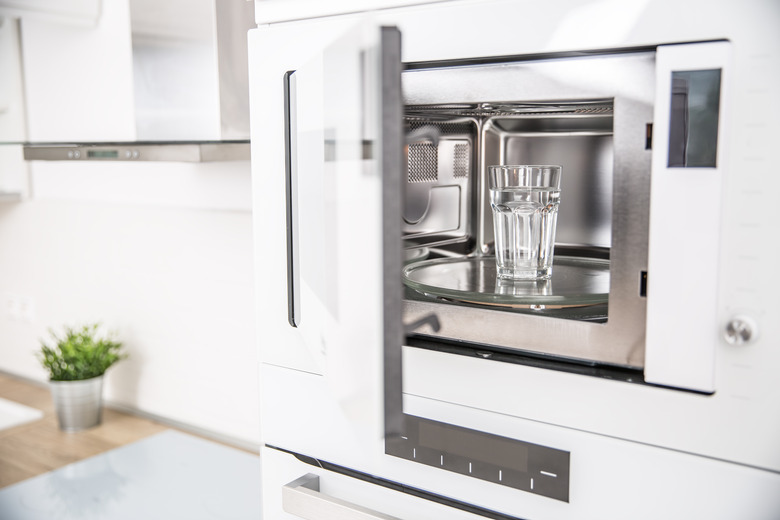How To Get Rid Of The Smoke Smell After A Microwave Fire
We may receive a commission on purchases made from links.
Where there's fire, there's smoke, and where there's smoke, there's an odor, even if the entire mishap occurs in a microwave. Smoke odors from food, electrical fires, or even burning plastic tend to linger indoors until you air out the room and clean up any residual mess. Burnt food odor goes away soon after cleaning up the mess in the microwave, but if the actual appliance caught fire, it may be damaged and should be replaced.
Common Causes of Microwave Fires
Common Causes of Microwave Fires
Most microwave fires happen due to human error, such as adding several minutes of extra cook time when reheating a meal, or by keeping a bag of popcorn cooking long after most of the kernels popped. In either case, smoke or a burnt smell should be a key indicator that it's time to turn off the microwave. Occasionally, food packaging may cause a fire, such as a larger-than-normal bag of microwave popcorn that gets stuck and hinders the microwave's functionality as the bag grows. If you catch a microwave fire in the act, or if you smell something burning, turn off the microwave immediately and unplug it if you see actual flames.
Electrical issues rarely cause microwave fires, but if you notice anything unusual with standard microwave operation, or if the cord is frayed and bare wires show, it's time to replace the appliance. Also, avoid heating metal objects in the microwave, such as foil or a fork. While these may not cause a serious issue, they probably will spark. Only use the microwave for food, and use it as recommended in the owner's manual.
Clean the Microwave Mess
Clean the Microwave Mess
If you're completely sure that only food caught fire and the microwave itself is still safe to use, start by cleaning out any burnt food residue. Wash the plate or platter that sits in the bottom of the microwave; in most cases, this can be removed and washed either by hand or in the dishwasher. Soaking this glass plate often helps remove burnt or caramelized foods that are difficult to remove with a scraper; this should be done before putting the item in the dishwasher. Once you've soaked it a while, scrape off the residue with a spatula or the edge of a butter knife, then wash the plate as you normally would.
Check inside the microwave for splatters and food particles trapped along the bottom inside the appliance; wipe any of these up with damp paper towels. Once you've removed all visible residue, the microwave is ready for deodorizing. It's also a good time to open the kitchen windows if the kitchen smells like smoke. Turn on an exhaust fan for a while, if you have one, or place a box fan near an open window with the fan blowing air towards the window to draw air out of the home. If you have a second fan, place it near another window, drawing outside air into the home to create a cross draft.
Remove Lingering Smoke Odor
Remove Lingering Smoke Odor
Even after cleaning and airing out the kitchen, your microwave may smell of smoke or burnt food. Vinegar banishes such odors with ease. Place a capful or so of white vinegar into a microwave-safe bowl or measuring cup and add about 1 cup water; add a little lemon juice if you prefer, for aroma and additional grease-cutting power. Put the platter or glass tray back in the microwave, then microwave the vinegar mixture for two minutes, or until the liquid simmers or starts to boil. Keep the microwave door closed for 10 minutes to allow the vinegar solution to steam clean the inside of the microwave.
Open the microwave and remove the container holding the vinegar solution. Dip a soft cloth or folded paper towel into the liquid once the outside of the container feels cool enough to touch, then wipe down the inside of the microwave with the vinegar solution. Wipe every square inch inside the microwave, including the "ceiling."
If any odor remains, repeat the steam-cleaning process. Wipe down the inside of the microwave with a stronger vinegar solution, such as equal parts water and vinegar. Leave the microwave door open for a while to let it air out. The vinegar smell goes away on its own in a little while.
